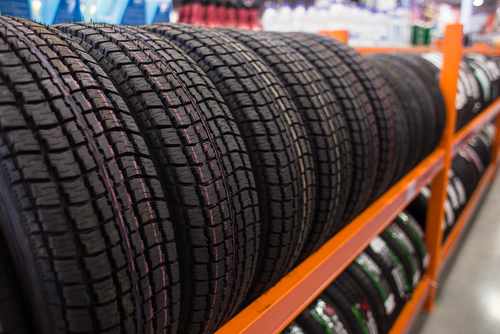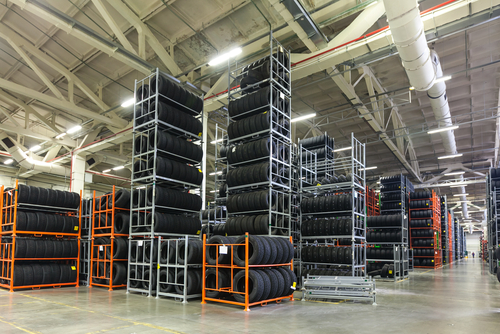If you deal with tires in your warehouse, fulfillment center, logistics company or dealership, you need a safe, reliable way to store them. Tires are like any other commodity within your business—they’re inventory, nothing more and nothing less. Therefore, you have to do everything you can to prevent damage to ensure that you don’t lose money. Rule No. 1 of tire storage is to always use high-quality, reliable industrial racking systems to keep vulnerable materials out of harm’s way.
Do: Clean Tires Beforehand
As great a material as it is, rubber has some downfalls, primarily that it’s susceptible to damage from moisture and chemicals. If you’re dealing with used tires or even new tires that have collected dust or any moisture, make sure to give them a solid clean before putting them up. With that being said, consider that excessive washing with any harsh cleaners isn’t good for tire rubber either, so use gentle cleaners and don’t scrub or brush aggressively.
Do: Store in a Cool, Dry Place
As much as possible, make sure that your tires are not exposed to any excessive temperatures. While the polymers used in automotive tires are, of course, designed for all-weather use, weather fluctuations do affect a tire’s quality and performance. Extreme heat can cause tire blowouts, and weather fluctuations can affect the air pressure. When stored on the floor or in a damp area, moisture can accumulate, which could affect the casings and steel cords when the tire is eventually mounted.
Do: Make Minor Repairs
The goal of a good warehouse tire storage system is to shelve tires in a way that ensures that they’re ready to go when you need to put them to work. In other words, minus a quick inspection and spiff-up, you should be able to deploy tires directly from rack to wheel. Thus, you should perform any minor repairs, patches and hardware updates before you store.
Do: Label Sensibly
Not only should your tire storage system keep tires in good shape, but it should also minimize headache and improve efficiency in your industrial facility. One way to ensure that workers can efficiently retrieve the right tires is through a well-thought-out labeling system. Most companies label their tires with stickers directly on the tire. Make sure to use a bright color and consider using barcode technologies so workers can quickly scan to identify what’s what.

Don’t: Stack Them Directly on the Floor
The best way to store tires in bulk and industrial applications is with tire storage racks. These systems not only keep tires up off the floor and away from dirt and moisture, but they also reduce pressure damage that could occur if tires are hung by hooks. Racking unused tires also makes retrieval easier and safer for employees. If traditional rack storage is not an option, we highly recommend stacking tires on top of pallets so that they don’t come into contact with moist or dirty floors.
Don’t: Store Them in Direct Sunlight
Another enemy of rubber is sunlight. Putting tires, or any rubber material for that matter, in the direct line of the sun for too long can cause UV damage and make the rubber heat up, creating permanent damage. Tires that are exposed to too much sunlight may develop sun-related issues such as ozone-cracking, which causes small cracks in the sidewalls or tread grooves of the tire. This kind of damage can also be caused by exposure to heat, vehicle exhausts and electric generators—so add those to the “don’t” list!
Don’t: Skimp on Safety
Last but definitely not least, it’s important that–when racking tires–you make decisions that prioritize employee safety. Don’t put tires on high racks without proper training and a reliable retrieval system to prevent slips and falls while employees remove tires from racks. Be sure to supply heavy-duty work gloves to anyone handling tires in your facility.
Let Us Help
With all of these great tips, you can be sure that when you retrieve a certain tire from your storage area, you’ll find one that’s clean and ready to be mounted. Container Exchanger is here to help with all your warehouse storage supplies, including warehouse containers and pallets, so don’t be afraid to get in touch if you have any questions or concerns.
